- Home
- Lynne Reid Banks
Two Is Lonely Page 6
Two Is Lonely Read online
Page 6
The children remounted their steaming ponies and trotted off, and Andy and I drove together to the village. We decided to go to the shop first. Outside I paused, as always, to look at the windows through the eye of a discriminating passer-by. The frontage needed a new coat of paint, but in a way that slight shabbiness made it blend better with the other, more elderly and conservative shops in the high street—at least till you looked in the window.
For four years after Dottie’s departure I strove unavailingly to achieve, in my window and shop-dressings, that originality and vital spark unique to her. But recently, her parting words had finally sunk in. ‘Us and Them is yours now. You must make it your own, and you won’t do that by copying me.’ Perhaps it took four years to get me over the feeling that it could really never be anybody’s but hers, since she had done all the work of starting it—the whole inspiration and impetus had been hers from the beginning. I often wondered if I really could have kept going, if Jo hadn’t come along.
Anyway, it was Jo’s and mine now, not Dottie’s. Inevitably, perhaps, we had departed to some extent from her original idées fixes. She would never allow anything into the shop which had not been hand-made. But simply in order to keep ourselves supplied we’d had to begin stocking factory glass, and I could never be quite sure of the pedigree of some of the other stuff we got from abroad, the wood and so on—some of it looked a bit too perfect to me; but unlike Dottie, I was prepared to wink an eye if it were beautiful.
So our windows—two of them now—didn’t have quite the look of rough-hewn craftsmanship they’d had under Dottie’s dominion. Nor were the displays ever as good. Dottie used to have themes for her windows, sketching designs for them first and working on them for hours down to the last detail. I, on the other hand, based my windows on more commercial considerations.
‘That’s a well-stacked bit of Anglo-American trade relations,’ Andy suddenly remarked. A splendidly large American lady swathed in mink was just coming out of the shop, with a uniformed driver, no less, behind her bearing a splendidly large parcel swathed in our wrapping paper. Jo stood in the doorway, beamingly seeing her out.
‘I do wish sometimes you weren’t quite so successful,’ said Andy grimly.
‘Why on earth do you wish that?’
‘I wish you were starving and destitute.’
I stared at him. I realised I knew him better than I had thought, because quite suddenly I knew that this odd and apparently joking remark was virtually a declaration.
On an impulse of escape, I started to climb out of the car. ‘We’d better start at the supermarket—’ I began, but he unexpectedly laid a brusque hand on my arm and pulled me back.
‘We’re not going shopping today after all,’ he said.
He put the car into second and it jerked forward. I didn’t argue. At the Swan, he stopped.
‘Don’t get out. I’m going to fetch the champagne.’
‘Oh, don’t let’s—let’s leave it for another time—’
‘No, I want it now.’
I sat still, suddenly chilled and apprehensive. He returned with the bottle of champagne still dripping ice-water, wrapped it in some newspaper and gave it to me to nurse. The coldness of it soon seeped through to my arms as we drove out of the village the way we had come. I began to shiver, mostly from some unidentifiable fright.
It was still raining and the men had not returned to the building site. We sat there in the Rover in silence for some time, both staring fixedly through the weeping windscreen, breathing heavily, until I suddenly said ‘If this goes on much longer I shall scream.’
Andy gave me a startled look, grabbed the bottle, and prised out the cork. It thwacked against the roof, ricochetted off and caught me a stinging blow on the temple. ‘Sorry,’ said Andy, not sounding in the least sorry. He clambered out and ran through the rain to the hut, returning at once with two glasses. The champagne, which he had left standing on the floor, had fizzed out, and somehow in the brief interval he had forgotten it was there and knocked it over with his foot as he got in again.
‘Oh pisspots!’ he roared, grabbing it.
I exploded.
‘What’s your trouble?’ he barked irritably.
‘Pisspots . . .’ I shrieked, rolling about helplessly. ‘Is that the worst word you know?’
‘It’s the worst I ever use, and I have to be driven almost berserk before I give vent to that. What the hell is so funny?’
‘Pisspots . . .’ I croaked, wiping tears from my eyes.
‘Oh here, for God’s sake, drink what’s left of this and get hold of yourself!’
I gulped down some champagne so fast that more tears came. If I get even a little drunk, I thought wildly, or if he does, God knows what’ll happen with him in this weird mood and me so tired and uncontrollable . . . We drank in silence and then Andy said, ‘Damn the stuff, I feel like chucking the bottle through the windscreen.’
I tossed off the last of mine and said nothing. I felt boneless and rather hysterical.
‘Today’s gone all wrong,’ he said with an effort.
‘I’m sorry,’ I said, and I was, because I knew what he meant and yet I felt heartlessly that he hadn’t really deserved it to go any better when he kept alternately shutting me out and expecting me to get in by some process of osmosis. Sitting there beside the ruined field, hugging our empty glasses, we had one of those moments of cold isolation, the cruel feeling of oceans rushing through the abyss between us. Each man his own island . . . Suddenly he reached across the gulf and gripped my hand. His eyes had a look of desperation as he pulled me, with entirely uncharacteristic roughness, towards him.
‘Damn it, what’s the matter?’
‘Nothing. We’re two separate people. Words are the only bridge, and you won’t use it.’
He stared into my eyes, his teeth set tight, and then he kissed me—the kiss so long wanted and so long deferred. That first kiss, which one always remembers, was, unlike subsequent ones, empty of the tenderness I had taken for granted, clumsy, almost brutal. But I loved that kiss, because it gave me what had always been lacking before—a sensation of communicated need.
I have been wrong about need for half of my life. My father needed me, and I him, and neither of us would ever admit it until the time for a father-child relationship had passed. Toby and I needed each other, and again you’d have thought it was some kind of deadly sin which we would both have died rather than give way to. Only when I had David did I begin to learn that needing another human being, and responding to that need, mutually, is rewarding and not degrading, that it builds a relationship instead of corroding it. Independence had been my watchword, and I’d spent years striving to achieve it. I had put independence first, and triumphed in a victory almost perfectly Pyrrhic over my heart and David’s life.
And now here was Andy, another independence-seeker, even more of an addict than I was for he sought to be independent even of shared thoughts. His unwillingness to communicate in words was nothing but an evasion; a desire for ‘perfection or nothing’ is actually only a way of avoiding reality. Yet now he kissed me as a child kisses, despairingly, without finesse, simply as a way of breaking down barriers. It did nothing to arouse me sexually; but every other part of me responded to it. I had not known at all that this, not the other, was what I wanted most from him; the open avowal, not of love or desire, but his need to be with me as two people alone need to be together, to meet, to touch, to be as close as it’s possible to be for as long as a life geared to separate entities allows.
When the kiss finished we were close together, our arms round each other, and he searched my face for a second from a distance of three inches and then, with a sudden shake of his head, he tried to pull away. But I wouldn’t let him. I tightened my arms round his neck and held him.
‘Let go, Jane. I’m hating this! I’m making such a mess of it.’ He twisted his head free and tried to get out of the car. But this time it was I who stopped him.
‘Where
do you think you’re going? You’ve lifted a corner of the veil and now look at you, you’re in a panic! What are you planning for us that can possibly happen, the way you’re going on? Does everything have to go exactly to plan before you’ll kindly agree to keep moving forwards?’
He stared at me aghast.
‘Why are you so angry?’ he asked. ‘Not because I kissed you—so badly.’
‘Of course not, you idiot. I needed that maladroit kiss more than I’ve needed anything for a long time. I think I’ve doubted if you were a human being at all. How can you be so self-contained? I’m not like that, I can’t love anyone like that. Not having to say things—that’s god-like. It’s a life-companion I want, not a communicated soul-process!’
‘Oh Christ I am a bloody idiot. Come here. Come here.’
After a while we changed cars. We lay on the horsey rugs surrounded by the shattered remains of the children’s picnic lunch and swigged down the remains of the champagne straight from the bottle. In between swigs, we kissed and cuddled (if that is not a completely outdated word and concept) and when we’d drunk it all Andy said,
‘There now, I’m drunk and that apparently was what I needed to break down my inhibitions and let me say it. I love you. I love you madly. I do love you. Blast it, but it doesn’t mean what I want it to! You see I’m right, words are empty, they’re like this bottle, you tip them over the person you’re trying to make understand something and nothing comes out, not a damn thing.’
‘You’re quite wrong, it’s dripping all over my hair.’
‘Dripping. That’s it. It drips meaning, when it should pour, it should deluge and drench you with my feeling . . .’ He threw the bottle down and rolled on top of me. ‘Jane, shall we do it here and now? Would that help to make it real? Oh hell—’ A car swished by so close I could see the driver, and Andy almost leapt off me. ‘It takes more than half a bottle of champagne to rid me of my inhibitions against making love in public. Sorry. You’ll have to take a rain-check on that one . . . The smell of horses doesn’t exactly help either . . . You’d never guess from all this what a vigorous lover I can be, given the right circumstances . . .’ He sat for a moment, staring out of the back window, and then turned to look down at me. ‘Having said it, I want to hear it from you,’ he said in an altered tone.
A long moment passed.
All this—the first genuine physical contact, especially the recent sensation of his deliciously big, heavy body pressing mine down onto the unyielding floorboards, not to mention the champagne which had evidently been freely adulterated with powdered rhinoceros horn—had aroused me almost beyond the point of reason, fairness or honesty. The words he wanted seemed true, simply because to say them would express some part of what my body was feeling, but more because they would open the way to the sexual relationship which was now, at this moment in time, more important to me than anything else.
But I had not forgotten Toby, and because of him this happy moment with Andy, which could have been so simple and have led to all my problems being solved, was suddenly rendered ambiguous—not spoilt, but unclear, out of focus, viciated by doubts. To give him his straightforward love-word would have been to tell a lie; and lies, while they may well be safe and even necessary further on in a relationship, are not tolerable at the beginning.
He was waiting, a frown deepening on his face.
‘You do love me, don’t you?’ he asked sharply.
‘I want to,’ I said slowly. ‘Only it’s a lot more complicated than you think.’
‘You want to?’ he repeated, blinking and looking around him as if becoming suddenly sober. ‘But of course, that’s not enough.’
‘Of course it’s not. But it’s only the beginning. Now you’ve put your foot on the bridge, the word-bridge, we may only have to walk across it towards each other.’
‘You mean talk.’
‘Talk, and kiss.’
He turned away, putting his head down on his arms and knees. ‘I don’t want to kiss any more,’ he said. ‘You can’t have it both ways.’
I sighed heavily, aware abruptly of my wet feet and my weariness. ‘Oh Andy! Come on then. Let’s go home.’
Chapter 4
AS I CAME into the shop next morning, Georgie, our assistant, looked up from a packing-case which had been delivered the day before and said, ‘Look here, Miss Graham, one of these little animals has a crack in it.’
‘Good girl, Georgie,’ I said warmly, and she smiled. She had long, straight, reddish hair cut in a box-fringe which, in accordance with teenage fashion, fell into her eyes; her mini-skirt just covered essentials, and in her boots she looked like a principal boy in a pantomime, except that she wore no make-up. The whole effect was very nice, but gave a frivolous impression which was entirely misleading. Our Georgie was no hippie, but a serious girl with her eye on a career, first with us, and later, I guessed, in London.
We worked together for a while, I in silence (I had a lot on my mind), Georgie chatting endlessly and rather soothingly, like the gentle continuous splashing of a small busy waterfall. Suddenly she broke off to say, ‘Oh, by the way Miss, there’s a letter came for you, quite a nice fat one.’ And she went into the back and returned with a long envelope with my shop address typewritten on it and a London postmark.
I actually left it sitting on the table for ten minutes while I arranged a shelf—it was getting on for nine, and besides, I thought it was just some business letter. Personal letters had never come to the shop. Then everything was ready to open and I still had a few minutes in hand. I sent Georgie into the back office to make a phone-call, and leant against the big pine refectory table we use for the fabric displays and disinterestedly tore the letter open.
It was from Billie—one sheet of it. The rest of the bulk was a second, folded, envelope, addressed to her, with a foreign stamp on it. Also typewritten. But this time the type was familiar. I knew that machine with its jumping s and its crooked t . . . knew it and remembered it from long ago.
Billie had written:
‘My dear Jane,
After some thought I’ve decided to send this letter on to you. I’ve had it some time. Really couldn’t make up my mind before. Hope you understand why. There seemed to be some element of maternal disloyalty somewhere.
To put you in the picture, Melissa is living in a flat by herself, or at least only with Carrie, who’s four now. As you’ll see from the enclosed, Rachel is with Toby. We were all desperately against this, not of course because of Toby but because of where he insisted on going. But he said he was entitled to one of them no matter where he decided to live, so finally we settled on Rachel, who, though only six, seems a tough little customer and absolutely devoted to her father, more than to Melissa. Fair enough I suppose, but with the situation over there being what it unhappily is just now, we are nearly worried to death for their safety. We miss her desperately. And I at least miss Toby too.
I won’t go on, since Toby’s letter tells all the rest. He hasn’t written to me since this, but Melissa hears quite regularly. I gather his letters to her are really no more than reports on Rachel, and she writes the same way to him about Carrie.
Your aunt’s book has gone into its fourth printing both here and in America. Whoever would have thought it, after those notices? It must be what we call word-of-mouth publicity. Well-deserved.
Hope to see you sometime.
All the best my dear,
Billie.’
I must admit I only completed this after I had ripped open and read through Toby’s letter twice. The stamp on it was Israeli. Even at that crucial moment I earmarked it for David—it was a beauty, with a bird on it in mosaic.
‘Dearest Billie,
I’m sorry this is only my first letter, and I’m going to make it a long one because it’ll probably be my last for ages. I seem to be suffering from a writing block which even extends to letters. Don’t worry, I’ll get over it. But it may take some time.
W. will have told you tha
t we arrived safely, and about the difficulties I had getting myself into a kibbutz because of having Rachel in tow. It meant I counted neither as an unencumbered volunteer nor as a family wanting to settle. I think I only got in here at last because of what they call here “protectsia”, which means pull—one of the many anonymous bureaucrats I encountered in my search for a home had read my books. No-one in the kibbutz he sent me to ever has, and no-one here gives a damn about me as a writer—very good for reducing the ego. Here I am a working hand, and it’s been made pretty clear to me that I have to work for two. I was only accepted on condition that I stay at least a year. Otherwise they wouldn’t take Rachel into the children’s house. You can understand it—too disruptive for the others to have kids coming and going. Continuity and lack of change and upheaval seems to be a built-in part of the system. Well, I approve. Poor kid, she’s had enough upsets to be getting on with.
I thought it would be terribly difficult for her to make the transition to a children’s house, but it turned out only to be hard for me. After a week of sleeping in my little room with me, and playing with children her own age during the day, she voluntarily moved over to sleep there. She hardly glanced at me when the time came to say goodnight. I slept there for a week on a campbed, as is customary, but she didn’t wake up once. I was glad of course, but I felt a bit hurt, I must say! However, she makes it clear, during our curtailed time together in the afternoons, that I’m still important to her. I comfort myself with the realisation that, wherever I lived, I wouldn’t be able to see much of her during the day, and here we’re allowed to put them to bed at night, which isn’t the case in every kibbutz. Having sixteen other lots of parents around at the same time necessarily detracts from what I had thought was essential privacy, but one gets used to it.

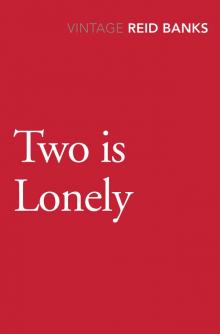 Two Is Lonely
Two Is Lonely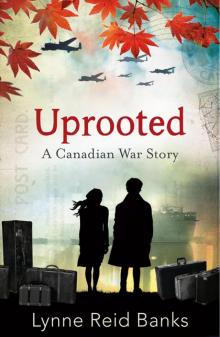 Uprooted - a Canadian War Story
Uprooted - a Canadian War Story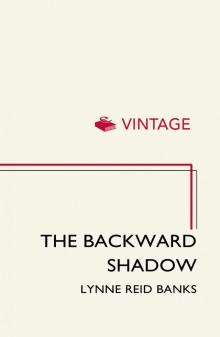 The Backward Shadow
The Backward Shadow Harry the Poisonous Centipede: A Story to Make You Squirm
Harry the Poisonous Centipede: A Story to Make You Squirm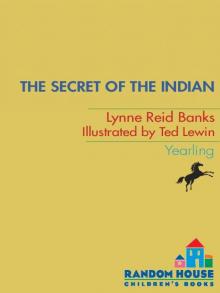 The Secret of the Indian (The Indian in the Cupboard)
The Secret of the Indian (The Indian in the Cupboard)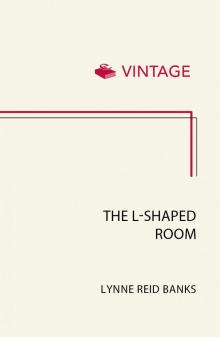 The L-Shaped Room
The L-Shaped Room The Mystery of the Cupboard
The Mystery of the Cupboard The Farthest-Away Mountain
The Farthest-Away Mountain Harry the Poisonous Centipede Goes to Sea
Harry the Poisonous Centipede Goes to Sea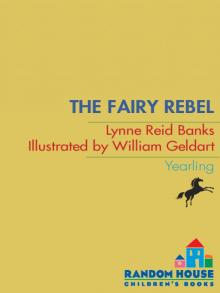 The Fairy Rebel
The Fairy Rebel Harry the Poisonous Centipede's Big Adventure: Another Story to Make You Squirm
Harry the Poisonous Centipede's Big Adventure: Another Story to Make You Squirm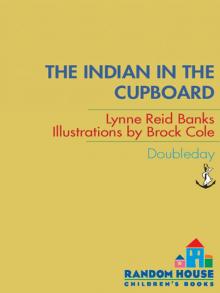 The Indian in the Cupboard
The Indian in the Cupboard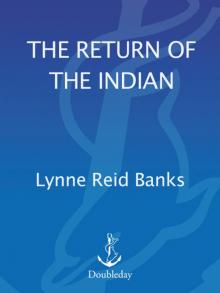 The Return of the Indian
The Return of the Indian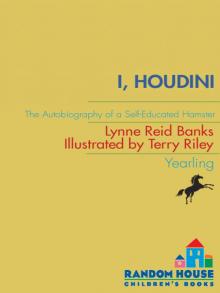 I, Houdini
I, Houdini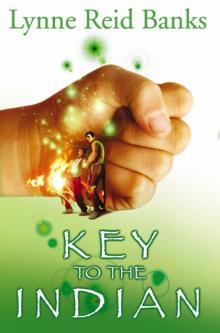 The Key to the Indian
The Key to the Indian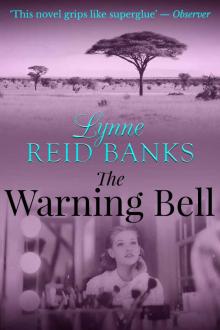 The Warning Bell
The Warning Bell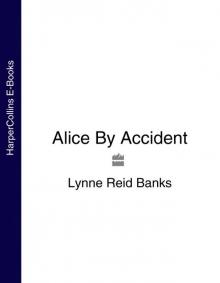 Alice by Accident
Alice by Accident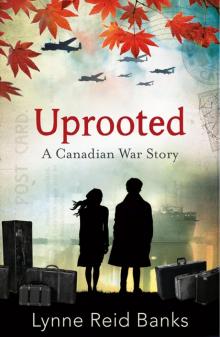 Uprooted
Uprooted Writing On the Wall
Writing On the Wall The Adventures of King Midas (Red Storybook)
The Adventures of King Midas (Red Storybook) Harry the Poisonous Centipede's Big Adventure
Harry the Poisonous Centipede's Big Adventure Harry the Poisonous Centipede
Harry the Poisonous Centipede The Dungeon
The Dungeon Bad Cat, Good Cat
Bad Cat, Good Cat The Indian in the Cupboard (Essential Modern Classics, Book 1)
The Indian in the Cupboard (Essential Modern Classics, Book 1) Tiger, Tiger
Tiger, Tiger